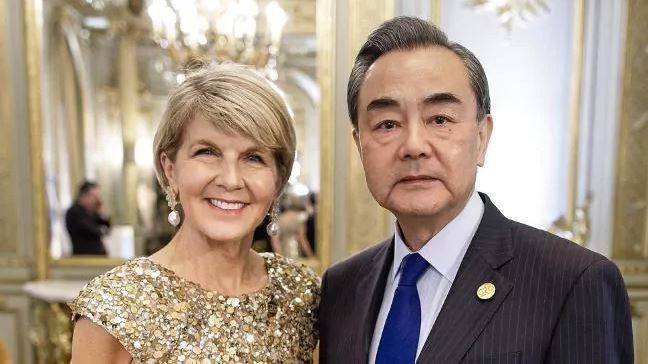
Julie Bishop was playing a dangerous game when she privately blamed the Australian media’s ‘negative reports’ for adversely affecting Australia–China relations during her meeting with her Chinese counterpart on the sidelines of the G20 in Argentina this week.
The Foreign Minister didn’t include any mention that she had scapegoated Australia’s fourth estate in her own rosy version of the encounter, but Beijing made sure to highlight it in their version of what they pointedly described as ‘not an official bilateral meeting’.
No doubt Beijing will be delighted to amplify Bishop’s message that the Australian media is to blame for the nadir in relations between the two countries. After all, it was the Chinese embassy in Canberra that first laid the blame on ‘fake news’ from the Australian media for ‘harming mutual trust’.
Ever since the leader of the free world took to labelling reports he doesn’t like in the US media as ‘fake news’, Beijing’s propagandists have adopted the term with gusto. Reports of Beijing’s plans for a military base in Vanuatu? ‘Fake news,’ according to the Chinese foreign ministry. Western reports of human rights lawyers being tortured? ‘Fake news!’ according to the People’s Daily.
At any rate, Bishop’s excuse for the deterioration in relations looked fairly hollow when, just a day later, her Western Australian Liberal Party colleague, Andrew Hastie, used parliamentary privilege to shine further light on the Chinese Communist Party’s influence operations in Australia. Pretending the Australian government doesn’t have a beef with Beijing isn’t going to cut it.
Instead of standing up for the free press like Hastie did, the Foreign Minister and her diplomats in the Australian embassy in Beijing have been running down our media to their Chinese counterparts. As Fairfax’s reporter in Beijing, Kirsty Needham, attests, blaming the Australian media has been ‘the consistent line to the Chinese from DFAT’.
It has become depressingly routine for Australian billionaires doing business with China to denigrate the media. Just last week, Andrew ‘Twiggy’ Forrest , while standing next to Julie Bishop, moaned that the Australian media doesn’t run the official government line.
‘They [Australia’s media companies] don’t have government endorsement. They are not the government voice. They are business people trying to sell a few newspapers,’ Forrest told reporters gathered at his Cloudbreak mine. ‘When it gets reprinted in China, it does break my heart.’
But it’s another thing altogether for Australian diplomats, who according to DFAT’s Foreign Policy White Paper, are supposed to be ‘determined advocate[s] of liberal institutions, universal values and human rights’, to do the same.
That’s not to say that the Australian media gets it right all the time. When Yancoal director and former China ambassador Geoff Raby claimed that ASIO was the ‘most likely source’ for the Dastyari/Huang Xiangmo phone-tap story leak in a recent blog post, the Australian media repeated it uncritically.
Left out of the reports was the crucial context that Prime Minister Malcolm Turnbull had specifically ruled out ASIO’s involvement. The claim that particular leak was ‘intelligence agency–sourced’ has been repeated in the media despite the fact that there are other, much more probable explanations.
Of course, Raby’s claim was immediately picked up by the fiercely nationalistic Communist Party mouthpiece, the Global Times. And once that media cycle had run its course, Raby fed the beast once again by dramatically calling for Julie Bishop to be sacked.
It’s an entirely predictable feedback loop that is reportedly frustrating our Beijing-based diplomats immensely. But instead of blaming the media, the government needs to start thinking outside the box.
For one thing, the Australian government should be giving diplomats sufficient resources and leeway to be more on the front foot with their digital diplomacy efforts in China on platforms like Weibo and WeChat. Public diplomacy is vital, and doubly so when bilateral relations occasionally sour.
As my upcoming report on ‘Weibo diplomacy and censorship in China’ will show, the Australian embassy barely makes it into the top 10 foreign embassy accounts on that platform, and is clearly hesitant to be on the front foot with its messaging.
While the Australian government vacillates, former Prime Minister Kevin Rudd is aggressively running his own line on Chinese social media. Instead of blaming the media, Julie Bishop and Malcolm Turnbull should at least join Weibo and take part in the conversation.

